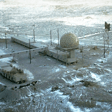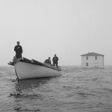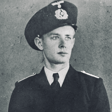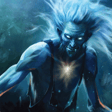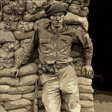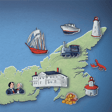Become a Creator today!Start creating today - Share your story with the world!
Start for free
00:00:00
00:00:01

Quest for the Northwest Passage
The obsessive quest to find a sea route through the Arctic to the riches of China and India claimed the lives of hundreds of European mariners. Best-selling historical author Ken McGoogan discusses the bold and gruesome three-hundred-year search for the Northwest Passage with Kate Jaimet, senior editor of Canada's History magazine.
Transcript
Introduction to Stories Behind the History
00:00:05
Speaker
Welcome to Canada's History's Stories Behind the History podcast. I'm Kate Jamit, senior editor of Canada's History magazine. And in this podcast, we take a deeper look at some of the stories in our award-winning print publication.
Jens Munk's Expedition: A Tale of Survival
00:00:18
Speaker
In our June-July 2022 issue, Ken Magugin writes about the Danish explorer Jens Munk and his disastrous 1619 expedition in search of the Northwest Passage. But what is the Northwest Passage and why were so many European sailors willing to risk their lives to find it?
00:00:36
Speaker
Ken McGugin is the author of 15 books, including five bestsellers about Arctic exploration and has won numerous awards for his work.
The Allure of the Northwest Passage
00:00:45
Speaker
He joins me today to discuss the bold and gruesome history of the search for the Northwest Passage. Ken, welcome to the podcast. Bold and gruesome. We got to love it. Thanks. So I have to admit that I am morbidly fascinated by these stories of these explorers who meet a grisly death
00:01:05
Speaker
while searching for the Northwest Passage. So I'm so glad that you could join us and talk to us about it.
Historical Significance of the Northwest Passage
00:01:13
Speaker
So what is the Northwest Passage? And maybe you could explain how it sort of existed in people's imaginations before they actually knew if it actually existed in reality or not. Yes, absolutely. Well, the passage is indeed a concept. It's an idea. The idea is getting from Europe
00:01:34
Speaker
over to cacé, which embodies India and China. And it was driven by profit-seeking, by merchants, mainly in Britain initially, who faced a particular challenge in the 17th century and the late 16th. The Portuguese and the Spanish controlled the trade routes to China and India.
00:02:01
Speaker
And they were coming home with all these wonderful goods and the merchants in Britain scratched their heads and said, gee, you know, it'd be awful good to get in on this action. And then how are we going to do it? Well, you know, if we're here and, you know, Cathay is just over there, why don't we just, you know, find a way through, you know, call it the Straits of Aenean or the Northwest Passage, you know, get from here to there. How difficult can that be?
00:02:30
Speaker
So that's how the idea was born. It seemed like a good idea at the time. And this passage would be over the top of what we now call Canada, right? That was sort of the idea of like to go north over top of that continent that was kind of blocking their way. Exactly. They had no idea even that it was a continent. They just knew, well, look, I mean, we're here, they're there, we can, it's not a continent. It's just a little bit of land, you know, or maybe,
00:03:00
Speaker
should be sea all the way, open sailing, and let's do it. So they wanted to go to China, to India, via the West, rather than going around the Horn of Africa, which is where the Portuguese were going, right? Yeah. So there are all kinds of Portuguese and Spanish pirates out there plundering the ships. So that wasn't really viable. So how are they going to do this? So it's very much a European idea.
00:03:29
Speaker
you know, the Northwest Passage. Okay. And so tell me about how they then first started out trying to find this thing and who were some of the very earliest people who tried this and then what happened to them?
Pioneering Explorers: Frobisher, Hudson, and Others
00:03:42
Speaker
Well, the most prominent early one would be Martin Frobisher in the late 1500s. And he actually went three times. He ended up, you know, they were looking for gold while he thought he found gold.
00:03:59
Speaker
He piled his ships high with these black rocks that seemed to have all kinds of gold in them. And of course, it ended up being fool's gold, which was kind of unfortunate from his point of view. It's not easy sailing in these tiny little wooden ships in some of the heaviest seas in the world. Not as bad as down the Drake Passage and so forth,
00:04:29
Speaker
It can be pretty bad up north there, and crossing Davis Street. So he was early on, but then came 1610, another figure who was well known. That's Henry Hudson. These guys had a certain mindset. Hudson was known as, for example, well, they were swashbucklers.
00:04:57
Speaker
you know daring individuals Hudson was known to take his orders and head out and see if the orders were working and um well it wasn't working I'm going to go my own way I'm going to go I'm deciding what I'm going to do I kind of enjoy these guys in that respect so Hudson um he takes a few voyages around and then he manages
00:05:27
Speaker
you know, to cross Davis Street, enter in through Hudson Street, which had been known, but no one had gone into Hudson Bay. Okay, you know, you're heading west is what you do. Oh, Hudson Bay. Whoa, this is a big, big place. And at this point, you have no idea, you know, you can't see the other side. So you're sailing along and
00:05:52
Speaker
Well, winter comes on. That's always a bit of a problem. As you probably know, anybody listening probably knows the northern Canadian winter. I grew up in Montreal myself, so I know a bit about winter. But winter up north can be, you know, still more dreadful. So Hudson's with his men. I think he's got 21 or 22 men, small little ship made of wood, right?
00:06:21
Speaker
By the time you get down in the southern reaches of Hudson Bay, down in James Bay and so forth, okay winter's coming on. And you're getting frozen in the ice. So okay, and that's okay, we can get through this. And they do manage to get through that first winter, but it is bitter.
The Mysterious Fate of Henry Hudson
00:06:46
Speaker
And when spring starts to come,
00:06:51
Speaker
The guys are saying, OK, we've had just about enough of this. Let's head for home and Hudson saying, oh, oh, no, no, no, wait a minute, guys. We're not going to quit. We're going to keep looking for this passage through the other side here. This is how it's going to be. He sets up a chart and he shows them. Here's what it looks like. And they are not convinced to say the least.
00:07:18
Speaker
And don't forget, you're also shut up on this tiny little ship. So there's personality conflicts arising by now. Anyway, comes the day a couple of guys lead a mutiny. And Hudson has two boys, two young men with him, including one is his son. Anyway, the mutineers put Hudson and eight people into this
00:07:46
Speaker
little boat, basically a big rowboat, and say, okay guys, not giving them any food or anything, okay guys, we've had about enough of you, so we'll see you later. So then there's the incredible image, certainly fixed in my mind, of Hudson and these guys desperately rowing after the ship as it sails away. The ship just raises its sails and goes back to England and makes it back there.
00:08:15
Speaker
They tell a story, of course, they could be charged with mutiny and hung. But a couple of these guys now, they realize, like Robert Violet, he's a pretty good navigator. And if these guys have already been over looking for the Northwest Passage, they have a pretty good idea. So we'll just charge them with murder and acquit them. And then they can go back out and hunt another voyage. So that's the kind of thing that went on.
00:08:44
Speaker
So these mutineers, they actually got acquitted because the merchants or whoever figured they were too valuable to lose. Yeah. Wow. That's basically it. Well, I mean, it's all interpretation, right? But lo and behold, the guys are back on a ship, you know, a year or two later. So figure it out, right? So, but Hudson, he dies, right? I mean, he parishes. Yeah, he disappears. The bodies have never been found.
00:09:13
Speaker
Yeah, it's a fascinating story, but certainly Hudson was never heard from again alive. That's for sure. Wow. Did they think that they had reached the Pacific Ocean initially when they went into Hudson Bay?
Jens Munk's Tragic Journey
00:09:25
Speaker
Did they think, hey, this is it. This is great. Yeah. Well, they wondered because they did do some exploring down in James Bay. So there was a coastline trending north. So maybe not, but surely there was a way through is what they were thinking.
00:09:43
Speaker
So that was yeah, so that led then directly to the ends monk expedition a few years later Monk is thinking well why should these British navigators get all their glory and he's a Very he's a veteran navigator as well. And you know, he's got something on that same mindset of You know how take the highmost I'm going for the Northwest Passage and
00:10:12
Speaker
We already know that if you go through here, all you have to do then is find the way out on the other side. Right. So they knew how to get into Hudson Bay. Now the question is how to get out of Hudson Bay to the riches of China and India, right? That was in their mind. Exactly. Exactly. That's what they thought they were doing. So I know we have your whole article about Jens Monk, but Jens' expedition does not end well either. Well, no, it doesn't.
00:10:42
Speaker
He gets across Hudson Bay, and he goes into what is now the Churchill River. That's not what he called it, but that's what we call it now, the Churchill River. He manages to go in there and land and ends up spending a winter there. By that time, I think he lands with 64 men, including himself, and 61 die. And incredibly,
00:11:12
Speaker
He and two others, they'd arrived with two ships. He and two others managed to make it back to Denmark. An extraordinary feat, really. Three guys making it all the way back across Hudson, through Hudson Strait, across David Strait, back to Europe. Extraordinary navigator, Jens Monk. And yeah, it was a complete, not a wipe out,
00:11:40
Speaker
the worst disaster certainly up until that time. Okay. I'm now a merchant in Europe and I've seen what has happened to Henry Hudson. He gets marooned and dies. His crew comes back and says, this man was crazy. He wanted to keep going west. No way in hell. Jens month goes 61 out of 64 people die.
00:12:05
Speaker
Why then? I mean, why did these merchants and kings and queens not just give up and say, look, we'll risk pirates around the word of Africa? Because this is just doom. We're just sending people into the ice to die. Like, what was it that kept people going? Well, you know, I think there's something in humankind. Why are we sending people, you know, up to the moon and, you know, circle the moon and we're heading for Mars?
00:12:35
Speaker
It's out there, we can maybe do it. And individually, the guys who do it, and it's all guys at this point, it's going to be fantastic. I mean, I'm going to be immortal. I'm going to be in history if I can just find this passage and sail on through. I mean, it's fantastic. So the merchants are backing me for their usual monetary reasons, and they're finding adventurers
00:13:04
Speaker
because there's always plenty of those, not plenty of those, but a few of those who are very highly competent outdoors and up for a challenge, like we're going to climb Everest. It's the same idea. Why did we start climbing Everest? Why are we going around climbing all these mountains? You know, if you look at it logically, there's maybe, it's maybe hard to explain, but until you, you know, accept this drive in humankind, I think,
00:13:35
Speaker
to go and to see, you know, and to search out and I'm going to be the guy who's going to do it. So that kind of thing, you know, you know, psychology, it's going to take someone with more of a psychological background than me to explain it all. And was there something in it monetarily for the sailors, like not just the leader of the expedition, the captain, but also he had to recruit people to go with him, right? I mean, they had to have some kind of incentive, the ordinary sailor guy to get on that ship, right?
00:14:04
Speaker
Yes, yes, absolutely. And the convention arose that, well, certainly there was a lot of piracy on the high seas, eh? And if you took a ship, the captain decided, OK, we're going to share this around. That was the deal. So if you were on the ship when you caught an incredibly wealthy merchant vessel, you would get the
00:14:34
Speaker
you'd get part of the share. So that would be pretty cool. So in addition to your salary, these are tough times. And guys are desperate for work or trying to stay alive. I've got a wife and two kids. I want to send them some money. So it's the usual thing.
00:14:56
Speaker
So these sailors, if they managed to get to the wealth of India and China, they would get some kind of a share of whatever this ship was gonna buy and presumably take home to England, right? Yes, exactly. Okay. So that would be an impetus for them until like Hudson's men, they got caught in James Bay and spent a winter there. That would cool their archer. For sure. So explain to me though, cause I've always wondered about the timing. Let's say you're leaving from
00:15:25
Speaker
England. You have to sail across the Atlantic. You have to then sail past Hudson Bay. You have to, even if you knew exactly where you're going, you have to sail all the way across, get out on the other side of Alaska, and then get to China. How would the timing work to do that? And could you actually do it without getting frozen in by the winter? Is there enough of a window of time there to get through in one of those old big sailing ships? No, there's probably not.
00:15:53
Speaker
Because you're still talking, back in this time, the little ice age is in full force. So it was colder. And now with global warming, we see the passage opening up a little bit more, well, quite a bit more. But even into the 19th century, it would open up, but not in a big way and not everywhere. Some areas just stayed frozen.
00:16:23
Speaker
You know, so they were dealing with that on top of everything else. So at the very, very best case, it would take at least one winter. At that time, given that technology, at least one winter, two-step process. Go in, winter over, carry on.
00:16:44
Speaker
So at some point they realized, okay, we're not going to do it in one season. We have to go, we have to let our ship get frozen, frozen into the ice for the whole entire winter. And then start off again in the spring. That was, that was sort of what they realized, right? Well, that's basically right. I mean, okay. That's what happened with John Ray, for example, who was working for the Hudson's Bay company where he signed on as a surgeon. He thought it was a summer job. They sail in.
00:17:12
Speaker
on the Prince of Wales. They sail in, they load up the ship, and then they start out. The ice is terrible. They couldn't get out. They had to return around, go back, spend the winter in the southern reaches of the bay, Charlton Island, and they're frozen in. And they're not really ready for that. They aren't hunters for the most part. Ray was a hunter, but
00:17:36
Speaker
most of the others didn't adapt well. People are dying on the ship. You know, the ice conditions could be bad, you know, storms are forcing you back, but guys got frozen in the ice, even just going between Greenland and Hudson Bay. They get, especially if they were going farther north, because they realized after a while, into the 19th century, well, late 1700s,
00:18:04
Speaker
Gee, it doesn't look like it's through here. So they started going farther north into what's known mainly as Lancaster Sound. And that would prove more viable, but a complicated bit of business.
00:18:22
Speaker
I want to talk about the Inuit people who obviously were living there and who encountered these somewhat crazy Europeans coming over.
The Franklin Expedition: A Catastrophe in the Arctic
00:18:32
Speaker
But maybe first, let's touch briefly on Franklin. I mean, maybe the most famous legendary failed Northwest Passage expedition. Tell us a little bit about Franklin. Yeah. Well, he sailed in 1845 from just south of London. It was May.
00:18:50
Speaker
They all called in an Orkney, which is where so many HBC guys came from, a place called the Loggins Well. They would take on some fresh water. Then they go across. And, and, and, and, and, and, and, and, and, and, and, and, and, and, and, and, and, and, and, and, and, and, and, and, and, and, and, and, and, and, and, and, and, and, and, and, and, and, and, and, and, and, and, and, and, and, and, and, and, and, and, and, and, and, and, and, and, and, and, and, and, and, and, and, and, and, and, and, and, and, and, and, and, and, and, and, and, and, and, and, and, and, and, and, and, and, and, and, and, and, and, and
00:19:19
Speaker
1845, 46, after probing north for a bit. And then he, you know, the ice breaks up and he starts south. And the ship gets, the ships, two of them, either of us in terror, they get trapped in the ice. They're ensues, yeah, they're the worst catastrophe in the history of Arctic exploration. How many men died in the Franklin expedition? They all died, right? They all died. I think there were 129, including Franklin.
00:19:48
Speaker
So that's double the end smoke catastrophe. But the Franklin expedition is kind of interesting, right? Because by this time, people have already figured out, like you said, it's going to take two sailing seasons. We know we're going to be frozen in the ice. Franklin's ready for this. And they've also figured out, OK, we can't go by Hudson Bay. It's going to be a dead end. If we're going to find this Northwest Passage, we're going to have to go further north.
00:20:14
Speaker
And so he does, and the island, like you mentioned, that he overwintered on Beachy Island, it's way beyond the Arctic Circle. It's further north than Baffin Island. He goes up there, he gets frozen in ice, all goes according to plan. So how did things then go so terribly wrong? He did get trapped in the ice after he went south from Beachy Island. Okay, you're talking about what happened. That's the greatest mystery in the history of Arctic exploration.
00:20:43
Speaker
And people have been arguing about it since 1847 to 48. I mean, trying to figure out what had happened. Well, actually, I write about this in my forthcoming book. A number of theories have been put forward as to what happened, because look, John Ross and James Clark Ross had spent four winters in the ice, trapped not far away from where Franklin was.
00:21:12
Speaker
down at the bottom offensive agent inlet. They had managed to survive and find their way back into the main channel there in the north and managed to hitch a ride home after four winters in the Arctic. Okay, so then the question becomes how come, that's just one example, how come the Rosses could survive four winters in the Arctic and Franklin perished after a couple of winters
00:21:40
Speaker
He's supposed to have all this food he brought with him, the state-of-the-art ships. Yeah, so what happened, that has been the biggest mystery. Wow, there's lots of mysteries. So we've got Henry Hudson's mystery, we've got the Franklin mystery, but help me with this, Ken. So after Franklin overwintered on Beachy Island,
00:22:04
Speaker
Why did he then go south? Why didn't he continue going west toward China and India, which was his ultimate destination? I think of the Northwest Passage as think of it as two channels, one in the north and one in the south. The southern channel is along the Arctic coast of Canada. By the time Franklin arrived and went in there,
00:22:29
Speaker
on his voyage. They knew of those two channels. You go in through Lancaster Sound. Now they had got cut off by this incredible mass of ice. There's no going through all the way through straight. But they knew that along the coast, because okay, Samuel Hearne in 1771 had become the first to reach the Arctic coast of Canada by traveling with this great indigenous leader, Matanabe,
00:22:58
Speaker
He hooked up with Metonymy and did it. But, you know, the way that Metonymy did with his Dene Chippewaian people, Hurry went along with that and he managed to succeed. He could, you know, he could learn from the native peoples. After that, so he, in effect, geographically planted a flag. Okay, here's the Arctic coast. Okay. They said the Arctic coast. Okay. So then they started looking. Mackenzie went down to Mackenzie River.
00:23:28
Speaker
He was disappointed. He called it the River of Disappointment because he thought he was going all the way to the Pacific. Instead, he finds himself on the coast, northern coast. So there's two points then in the north. And then you've got people heading east trying to figure that out. Let's see how far this southern channel extends. So they still didn't know that. They didn't have
00:23:54
Speaker
you know, fantastic flying ships that could go over, no drones to send up and see what's over the horizon. So the guys who did well were usually the fur traders traveling with, you know, inevitably the native peoples, including the Cree and the Ojibwe, who knew how to travel there. The fur traders knew enough, if this guy says it's too dangerous, I better not gull this particular way. You know, whereas Franklin would come in and say, ah, what do they know?
00:24:23
Speaker
I'm, you know, with the Royal Navy. So by the time he sailed in 1845, they had an idea that, okay, look, we got these two channels, one in the north, one in the south, all we have to do is to connect them. How hard can that be? Just coming in from the east and they knew they could get out the west. They could get out the southern channel, or they believed they did, by going along the coast. So all we have to do is go in here and get down there.
00:24:53
Speaker
get down to the coast. So that's what Franklin was attempting when he got trapped in the ice for good, in effect. Yeah, there's a whole saga of what happened and there have been countless books and I'm adding to that number.
00:25:12
Speaker
Well, we hope it will be the definitive one, Ken, and that no one will ever need to write another book about it after. The picture you're explaining now is a bit more complicated than the original, where it was just coming in on ships, because now you have fur traders going over land, they're going down different rivers, they've got these guides from various different Indigenous
00:25:37
Speaker
group so it's kind of getting like a bit more crowded up there as they're all sort of from multi-pronged approach to try to find this this passage is what I'm sort of imagining but what was the role then and this is a broad question but of the Indigenous people in finding or helping to find the passage because obviously they had local knowledge
00:26:02
Speaker
But they didn't have like a passage that they traveled through and they could just say, oh, yeah, well, here it is. Right. They didn't do that. No, no, because they were living there. They weren't seeking a passage that would go through there. I mean, they were living in their particular environments and adjusted to the land. But for example, in nineteen oh three oh four, when Roel Amundsen became the first to sail the passage. Well, how did he do the voyage? How did he find his way?
00:26:31
Speaker
between the Northern Channel and the Southern Channel. Well, there was a missing link there. That was the final link in what would become the first navigable passage. And the guy who found that, the explorer who found that in 1854, was this fur trade doctor, John Ray, but he did it with two indigenous people.
00:26:54
Speaker
William Willink Buck Jr., the Inuk, and Thomas Mistigan, who was an Ojibwe, because what happened was Ray was out looking and exploring and trying to figure out the lay of the land. And he sat out with a number of guys, and when he was down to four, two of them, you know, were not functioning well. Okay, this is overland. This is man-hauling sleds. This is really tough work.
00:27:23
Speaker
So in the end, there were only two guys that could keep up with him. Like he was in his late thirties, I think. And they were younger, but they were the indigenous guys who were with him. Mr. Ginn and Uligbach. And they were the guys, he went up along the coast of, well, this is getting a bit arcade, but along the coast of Boothia. And he looked out. See, there'd been a mistake made in the mapping.
00:27:51
Speaker
Because of the terrible weather, James Clark Ross had placed a bay where there was actually a strait. Now Ray went there and he's traveling across the land and he looks out and he says, you know what? He's with these two guys. He's saying, well, that's King William Island over there. We all thought it was King William land attached to the, to the mainland, but it's not. It's an island and there's water flowing through here.
00:28:21
Speaker
And that was the way, that was the missing link in the first navigable Northwest Passage. When Amundsen came, he came down through what became known as Ray Strait.
00:28:34
Speaker
And so that, that was, that little missing link was found essentially by a team of three people, two of whom were these indigenous guys. That's right. But broader than those two individuals, it must've been throughout the history that they were in, that these sailors were encountering, say, Inuit people are sort of asking them, Hey, what does the next hundred miles look like? Or kind of thing like, was that part of in play? I mean, in this sort of incremental, incremental discovery.
00:29:04
Speaker
Absolutely, because, okay, so Ray found that particular passage, but the opening up, okay, the Arctic Archipelago, Canada's multitude of islands up there and streets and so forth, what really opened it all up was the search for Franklin, which is driven essentially by Lady Franklin, an extraordinary individual in her own right. Okay, but in every case, the search for Franklin, they were relying on Inuit interpreters.
00:29:33
Speaker
like Tukulee who ended up being hunters to keep them alive. Because at this point, you're talking about Charles Francis Hall and Frederick Schwadka going in the 1860s and 70s. They're traveling Inuit style with the Inuit hunters and interpreters. And they're looking for people. Hey, were you on the ships? Did you meet Franklin? Did you hear about this?
00:30:02
Speaker
and things like that. So it was the interpreters and so forth who hadn't been there themselves oftentimes, but they could talk to the people who had been there because they could speak the language. So, and it was that search that gradually opened up the archipelago. So people, you know, the British then mapping, okay, yeah, okay.
00:30:30
Speaker
This is how the whole thing fits together. And it's extremely difficult to get through here unless you know what you're doing. And even now, I mean, we hear about ships going around. I was on one myself. So yeah, it's not well-charted underwater. There's a lot that's not charted even now. So yeah, I mean, there are certain routes that are extremely well known.
00:31:00
Speaker
but you put the ship in the middle of the strait, you know, you don't go over to the side here. So if I could, if I could sort of put this all together in a bit of a picture in my head of what's going on, is that after the initial, so the initial sailors were getting as far as Labrador and then they were getting as far as Davis Strait and then they got as far as Hudson Bay and then they decided
00:31:22
Speaker
We got to keep going west. And then gradually there are other explorers who are going over land with indigenous people and finding like pieces of the puzzle. Like this is what the coast looks like over here. This is what the coast looks like there. And then after you have John Franklin's expedition disappears and Lady Franklin
00:31:42
Speaker
basically sends these people to hunt for him. Then they're exploring even more and saying, these are what the islands look like. They're mapping it. They're gradually putting these pieces of the puzzle into place, right? Yeah. So tell us a little bit, just to cap this off, tell me about how Roel Amundsen is the first person to actually sail this thing. Well, yeah. He's a Norwegian adventurer.
00:32:09
Speaker
He learned how to ski earlier. And he's a smart guy. He would later become the first to reach the South Pole because of what he learned from the Inuit on these earlier trips. So he gave his small ship. And he sent two winters at Joe Haven. Now, Joe Haven was not a settlement at this point. His ship was called the Joe. And he found this, OK, things are getting difficult.
00:32:39
Speaker
You know, the weather's turning bad, winter's coming on, and he sails into this nice harbor. This haven, if you will. And then Inuit discovered him, and they began to trade with him. So he, you see, he's got a dual objective. He's also trying to figure out scientifically location of the North Magnetic Pole. That's a whole dimension here that we haven't really talked about, but
00:33:04
Speaker
It was that dimension that, you know, scientific knowledge had to figure that, why were compasses going crazy? Let's figure this out. So they were still embarked on that quest. So Amundsen sets up all these observatories. There's a hill there in Joe Haven. And you can go up and you can see where they were, his observatory. So he spends two winters there, and then he carries on through along the southern channel.
Roald Amundsen's Historic Voyage
00:33:32
Speaker
So that's, yeah, that's, yeah, Amundsen, any credits, John Ray, he says, you know, good thing he told me where that was, because I wouldn't have got, got, got the Joe Haver. So, yeah, so, yeah, so that's how, how Amundsen did it, became the first and wired from, you know, West Coast. That makes it sound so easy. I just sailed right through. Sure, that's right. Yeah, it was hazardous all the way along.
00:34:02
Speaker
Yeah, you know, these guys are adventurers. There's no question about it. Amazing. And the obsessiveness that's involved, you know, speaking as a writer, that's what's driving a large part of the interest. It's the obsessiveness of these guys that makes them interesting as characters, if you will, real life characters. They were bent on achieving something. So let's see what happened. By the time
00:34:31
Speaker
They actually got through the North or Rolled Amundsen actually got through the Northwest Passage in 1900 and what would it have been? Four. Okay, so 1904. The original purpose. Remember way back that original purpose that you could find China and trade and you wouldn't have to pass by the pirates in the case around the Horn of Africa. Does this, this original purpose has completely evaporated by that time or is this still? No, you know, they're realizing well,
00:35:00
Speaker
This is maybe a little wilder than we thought. But even today, there's an interesting debate and a worry, in fact. Think about oil tankers plowing through the Northwest Passage and oil spills. It's one thing if it's down off Florida. Well, yeah, you can get the emergency vehicles in there. You can get the ships.
00:35:29
Speaker
something happens in the Northwest Passage, whoa, that can take an oil spill. Wow, that would be something else. Well, the good news, well, quasi-good news on the left for it is, it's much more likely than anybody carrying oil is going to go through along the Russian coast, along what's called the North Sea Route. In other words, not the Northwest, but the Northeast.
00:35:56
Speaker
But this has gotten more complicated now that Russia has done what it's done geopolitically. And people are going to say, well, I don't think I want to go along the coast of Russia. But don't forget, it's also opening up a bit. So there may be more ways. People have identified, OK, there are six or seven different ways now to get through the past. If you go over here, down here, and around this way,
00:36:26
Speaker
because it's such a jigsaw puzzle, as you said. And maybe the ice will reduce enough that they are going through, but by then, we'll be in a whole other mess. So yeah, so it's still complicated. Is the Northwest Passage used as a commercial shipping route today? Yeah, a little bit. Because the reason being that it's a shorter route
00:36:54
Speaker
than going around some of the other ways. But it's so dicey and so forth. So what's happening more in the Northwest Passage is adventure travel. The company I did a lot of travel with was in Adventure Canada. You go up there and you see the animals, the polar bears. You meet the people who live there and the settlements. And that kind of thing seems to be blossoming.
00:37:24
Speaker
has been you know we got covid there for a while but yeah so that is is more what's happening in the northwest passage because it's not readily viable at this point i mean you okay you can get through if you've got an icebreaker even if you've got a great big oil tanker you bring an icebreaker in front of you and these things ride up on the ice and pound they pound through the ice in front of the ship behind them
00:37:54
Speaker
That's how, when push comes to shove, they pound through the ice behind the icebreaker. So obviously that's not an easy way, an easy way to do it. Global warming, climate change, maybe it'll become more viable. There are pros and cons, obviously.
00:38:17
Speaker
Is it international water or is it considered Canadian water or who would regulate? Now you want to get in a fight. Now you want to pick a fight with me. Canada says these are Canadian waters. It's obvious to me. The USA says, no, no, this is, these are international waters. So our closest pal, Uncle Sam,
00:38:46
Speaker
doesn't agree with what we say is internal they say no this is international so that's that's where that stands so the northwest passage remains contended and mysteries still abound you got it
00:39:06
Speaker
Well, Ken, thank you so much for joining us on
Conclusion and Ken McGugin's Upcoming Book
00:39:09
Speaker
the podcast. Thank you for elucidating our listeners about this. And of course, they can pick up any one of your five books about Arctic exploration and the upcoming one. When's that one going to be published? Yeah, that's coming in October. It's called Searching for Franklin. The Royal Navy man who discovered Arctic catastrophe coming soon. Sounds fascinating. Thank you so much, Ken. OK, you take care. Thank you, Kate.
00:39:36
Speaker
Bye.
00:39:38
Speaker
The Stories Behind the History podcast is produced by Canada's History Society. If you enjoyed the podcast, why not subscribe to Canada's History magazine? To subscribe or simply to find out more about Canada's History Society, visit us at canadathistory.ca. Our theme music is the Red River Jig performed by Alex Custerock from his album, Métis Fiddling for Dancing. I'm Kate Jamit, senior editor of Canada's History magazine. Thanks for joining me.
